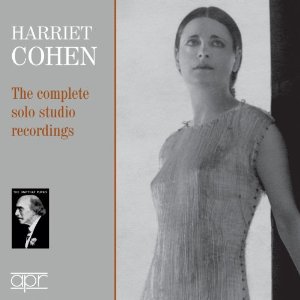APR’s series devoted to pupils of the influential British piano teacher Tobias Matthay continues with a three-disc collection containing the complete studio solo sessions of Harriet Cohen (1895-1967). Perhaps Cohen is known more for her colorful, eventful personal life than for her actual artistry, yet she was no mean pianist. Cohen ardently championed British composers of her day like Elgar, Bliss, Ireland, Walton, Vaughan Williams, and her long-time paramour Arnold Bax. Bartók dedicated the last six pieces in Mikrokosmos to Cohen, and she became the first pianist to play Shostakovich’s Op. 34 Preludes outside of Russia. Cohen also gained renown for her Bach, and was one of the first pianists to explore Byrd and Gibbons on the concert grand.
There’s much to admire in Cohen’s best work. Her pioneering acoustic recording of Bach’s D minor Concerto is surprisingly direct and crisply articulated for the era, while her softer-grained, lyrically-oriented first nine Preludes and Fugues remain convincing interpretations of their ilk. Conversely, some unsettled rhythms and dicey articulation hamper Mozart’s C major K. 330 sonata. Cohen underplays the agitated middle section of the Chopin F major Nocturne Op. 15 No. 1, yet overheats the F minor Nouvelle Etude. However, minimum pedal and maximum legato together with impressive linear differentiation add up to one of the best recordings ever of the Chopin Op. 25 No. 7 C-sharp minor Etude. The fluent simplicity throughout Brahms’ Op. 76 No. 4 Intermezzo is preferable to a fidgety, unstructured D minor Ballade Op. 10 No. 1, while Debussy’s La cathédrale engloutie sounds relatively hectic and overloud compared to more shimmering, pellucid shellac-era traversals by Gieseking and Cortot.
More valuable from both musical and historical standpoints are Cohen’s Bax recordings (especially the music from the composer’s Oliver Twist soundtrack) and Hubert Bath’s Cornish Rhapsody. Quite a few films in the 1940s included specially written mini-concertos for piano and orchestra in a faux-Rachmaninov style, including Cornish Rhapsody, which was featured in the 1944 film Love Story. Those who only know the work in its latter-day easy listening incarnations (there’s a really cheesy 101 Strings version on YouTube) or from Liberace’s television heyday will find Cohen’s full-bodied, passionate, yet straightforward playing revelatory. Excellent transfers and annotations make APR’s reissue all the more valuable.
































